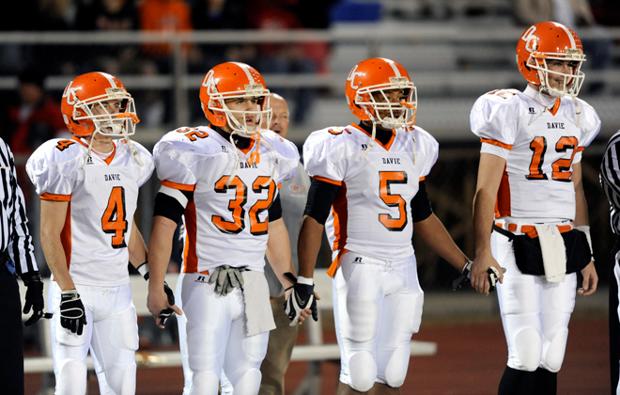As college football revs into high gear and public schools
begin across the nation, one of Robert Putnam’s suggestions for addressing
poverty and economic inequities between affluent kids and poor kids resonates
as particularly timely. In Our Kids: The
American Dream in Crisis, a steadfast Putnam believes extracurricular
activities offer “as close to a magic bullet” for closing opportunities gaps as
Americans are able to find (258). However, currently an odious element inherent
in extracurricular participation in school-based happenings wedges have-nots
from affordances offered the better-off.
 |
| High school and college sports season is upon us, including exciting match-ups like this one pitting my Masters-degree-granting institution against my undergraduate alma mater. |
Pay-to-play policies are the culprits, called “perverse” by
Putnam, who matter-of-factly states:
[I]f you are concerned about the issues discussed in this book, here is something you could do right now. Close this book, visit your superintendent – better yet, take a friend with you – and ask if your district has a pay-to-play policy. Explain that waivers aren’t worth the paper they’re written on, because they force kids to wear yellow stars….Explain that everyone…will be better off if anyone in the school can be on the team or in the band. Insist that pay-to-play be ended (258).
Putnam suggests offering one’s assistance in serving poor
children better as well, both in class and beyond it. He sees coaches, mentors,
and others serving in extracurricular leadership capacities as offering some of
the best hopes for progress in addressing the opportunity gap. Perhaps this is because
“Involvement in extracurricular activities has been shown repeatedly to have measurably
favorable consequences,” a truth “even after controlling for family background,
cognitive skills, and many other potentially confounding variables” (174). According to Putnam, among the favorable consequences
of engaging in extracurricular goings-on are:
- · Higher grades
- · Lower drop-out rates
- · Lower truancy
- · Better work habits
- · Higher educational aspirations
- · Lower delinquency rates
- · Greater self-esteem
- · More resilience
- · More civic engagement
- · Even higher future wages and occupational attainment (174)
- · Building soft skills and character (176)
Little wonder Putnam calls extracurriculars and those who
support them “magic!”
Indeed, when kids take on leadership positions within
such activities, research suggests the benefits are even more impressive. While
sure to point out that few studies coming to such conclusions are “true experiments”
in that participants cannot be randomly assigned as a participant or
nonparticipant, meaning there could be other variables correlating success and
involvement in extracurriculars, Putnam sticks to his researcher’s hunch that
enough evidence exists to note the longstanding correlations as pertinent and
important.
Putnam does not hesitate to state that “extracurricular
participation matters for upward mobility,” but poor kids are between 30%-50%
less likely to participate in sports and/or clubs than more-affluent peers
(176). Indeed, as with so many other social constructs mentioned in Our Kids, richer kids’ rates of
participation are rising at the same time as poor kids’ rates of participation
are falling (177). Surely pay-to-play policies marginalize would-be
participants from poor families. Putnam calls such policies “insidious” (180)
and sees them as indicative of the cultural shifts away from a sense of
communal responsibility toward a community’s young people and toward
segregation and institutionalized, generally-accepted segregation.
Pay-to-play fees take many forms. Some, where pay-to-play is
supposed to be illegal, take the form of donations that are de facto mandates.
Other districts enforce fees to play certain sports or to be in the band.
Equipment costs may be part of the fees or another added expense. While some
schools offer waivers for poorer kids, Putnam claims that the “inevitable
stigma attached to the waiver” (181) may be enough to keep less-affluent
children away.
Given that poor kids are even less likely to participate in
after-school activities that are not school-based, eliminating pay-to-play
policies could facilitate the “modest leveling effect on extracurricular
participation” that public schools can provide (181).
As a former band geek
from a working-class family, I can attest to the discipline, structure, and
sense
 |
| That's me, leading the band in 1993 or 1994, building my skills with the help of the school community, my band directors and boosters. |
Our band boosters were busy, to be sure, and we still
scrimped. I remember impressing the band directors when I noticed that if we
cut our music holder folders in half and stapled the loose half along the side
and bottom, we could save by not having to purchase as many over time, for
example.
Surely I felt the sting of not being from the North side of
town (readers from my hometown will understand why I capitalize “North”) and
being known as a weird kid a little rougher around the edges than many. For example, while it was a longstanding tradition
for the drum major to earn the MVP award at the end of the year, that didn’t
happen in my senior year. I know that because that was the second year I was
drum major for the marching band, one of the very first instances in my life of
folks telling me I was “robbed” of a deserved honor.
I remember beating out
every other contender for drum major by a two-to-one margin when try-outs were
held. The entire band voted after seeing us lead a small portion of our band,
which was a diverse unit in many ways. Had it not been socioeconomically
diverse, I doubt I would have won despite a superior performance. As evidence of my prowess, I do not mean that
I beat the second place finisher by twice as many votes. I mean I outscored the
entire field by twice as many votes.
Still, I seemed an unlikely outsider by the two directors,
both of whom seemed to want to talk me out of the position at times. I recall a
trumpet player encouraging me to use the whistle one director had given me at
our first football game, resulting in a desired rejection from the stadium that
the football coaches were able to talk officials out of enforcing in favor of a
fifteen yard penalty. That director must have just assumed I knew not to blow
the whistle during a game. Obviously (perhaps very obvious to the trumpeter) I
didn’t have that cultural cognizance yet!
I remember the other director asking
if I really thought I could direct music after I showed her my skills and misdirected
beats two and three of a four-four stroke, taking beat two to the outside of my
body and beat three to the inside. Generally, though, once they saw I had a
fire and mettle, they supported me as peer leader of the band.
Most of all, regarding the process by which I became drum
major, though, I recall creating and practicing my kata, calling commands and
executing them in reverse, on an empty red-clay field beside our trailer home,
drawing the attention of a nearby neighbor who wanted to know why I was yelling
and refused to chain the pit bull who accompanied him and who the neighbor made sure to inform me I was disturbing. It was under that
pressure and duress that I honed the sequence that won me that two-to-one
margin.
 |
| I know it's all in how you breed them, but I had no idea how my curious neighbor had bred his pit bull. |
As well, when our high school band was chosen to visit
Paris, France, for a New Year’s parade, family and boosters and other donors
made sure I was able to go, though I did have to remind one director, who asked
me why I thought it was more important for me to attend than it was for others
in the band to attend, of my position.
Overall, my ability to participate in band in high school
and the influences that facilitated my full participation helped instill a
confidence in me that I could not only do well in life, but that I could lead
in my own way. While currently I’m at a low point in my career and personal
life, still not fully employed and an outsider to my chosen fields in academia
and struggling to find my place again, the discipline, resiliency and
character-building I learned through this extracurricular forged my previous
success and will have instilled in me the stuffs I need to be successful again.
Had my district enforced pay-to-pay policies, I might never have thought I was
worthy enough to lead peers, to march to my own beat while fully capable of
leading the beat of others.
I join Putnam is asking you to address opportunity gaps in
your children’s schools by eliminating pay-to-play policies in favor of
strategies that embrace an “our kids” mentality. Putnam is short on specific
strategies, but he appears to see parental and community activism as the start
of alternatives to these insidious, segregationist requirements.
For more on pay-to-play in public schools, including concrete suggestions, see *"The Activity Gap"* and resources *here* and *here.*




No comments:
Post a Comment